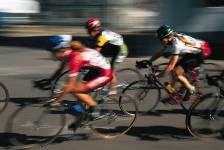Water Intoxication
Can Athletes Drink Too Much Water?
Note: As an Amazon Associate I earn from qualifying purchases.
Water intoxication is a condition caused primarily by drinking too much plain water too fast.
When this happens, the cells and tissues of the body swell and can cause numerous problems for athletes and fitness enthusiasts.
Even though this condition is relatively rare with recreational exercisers, it is something that everyone needs to be aware of, especially during high-intensity exercise or activities lasting for more than an hour.
Most people are simply not going to drink too much water too fast during exercise to cause water intoxication.
Water Intoxication Can Lead to Hyponatremia
However, drinking too much water along with excessive or prolonged sweating can lead to a condition called hyponatremia.
Hyponatremia is a result of excessive electrolyte losses in the body and a decreased concentration of sodium in the blood.
Electrolytes (electrically charged minerals such as sodium, magnesium, potassium, and calcium) are critical for nerve and muscle function. Most athletes are well aware of the negative impact an electrolyte imbalance can have on their athletic performance and ability to recover.
Signs of Hyponatremia
The typical signs of mild to moderate hyponatremia include loss of muscle control and disorientation.
We see this fairly often with novice athletes participating in their first marathon or other endurance events.
Other warning signs may include nausea, slurred speech, headache, or muscle cramps. Since these signs are similar to the symptoms of dehydration, many novice athletes will assume they are dehydrated and drink more water.
Unfortunately, drinking more water at this point only further decreases the sodium concentration and intensifies the condition of hyponatremia.
If an athlete has these symptoms and knows she/he has been drinking plenty of plain water during the event, I recommend consuming 16 oz. of a sports drink that contains sodium or eating some salty foods (whichever is readily available).
Then continue to drink 16 oz. of an electrolyte replacement drink every 30 to 60 minutes or until symptoms are gone.
Extreme cases of hyponatremia (which are relatively rare) can lead to seizures, a coma, or even death.
This condition is obviously not something to consider lightly and a medical professional should be consulted right away if symptoms are moderate to severe.
The good news is that both conditions are easy to prevent with proper hydration and electrolyte balance before, during, and after exercise and sporting events.
How Athletes Can Prevent Both Conditions
The best way athletes can prevent both conditions is:
- to stay fully hydrated each and every day and
- to learn when to drink water vs sports drinks.
Be sure to consume electrolyte replacement drinks (which should contain sodium and other electrolytes) before, during, and after high-intensity and endurance activities, and especially during hot weather.
In addition, when you know you are going to be involved in high-intensity exercise or endurance activities, be prepared.
Learn how to gauge your fluid loss and electrolyte replacement during the event and stick with a hydration schedule.
Consult with trainers or experts in your sport and develop a customized fluid replacement program that will help you prevent dehydration as well as hyponatremia.
Also try to train in conditions similar to what you will experience on the day of your event or race.
Return from Water Intoxication to Proper Hydration Basics for Sports

If you would like to reproduce or republish this article or any other article on this site, feel free to do so but please include a reference or link to the article at WaterBenefitsHealth.com.
Sign Up for Our Monthly
Newsletter
Visitor Comments
"This was the best and most straight forward info on the net yet. I asked a question and got an answer that made sense. Thank you so much!" - Linderlinder
FINALLY!!! I have been wondering about this for years with no 'solid' answer. This is exactly what I've been wanting to know! Thank you for this share..." by Andy
"Thank you for the information, Nancy. I appreciate it. Your article and findings are very helpful, referring to dehydration." - Carolyn
"Lemon water is one drink both my wife and I can't drink. It upsets our stomachs. We are in our sixties and in very good health—well, better health now that we drink about 2 liters plus of water each day. It has made so much difference to our digestive systems and recovery every day. Thank you for your website and effort." - Rod



